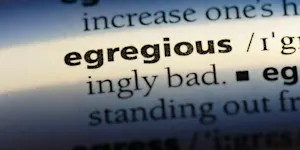What Makes This Word Tick
The word "tantalize" evokes a sense of temptation combined with the frustration of unattainability. It's the feeling you get when you're aware of something delightful just out of reach—a slice of cake on the other side of a locked display case, if you will. There's a playful hint of the mischievous, as if the word is enjoying your longing.
If Tantalize Were a Person…
Imagine tantalize as a prankster with a penchant for teasing just for sport. This person would always keep a glimmer of hope sparkling in their eyes, yet never fully deliver what you're hoping for. They'd be that friend who always knows the restaurant with the longest wait, yet insists it’s absolutely worth it.
How This Word Has Changed Over Time
Originally hailing from the myth of Tantalus in Greek mythology, where he was eternally punished to stand in water beneath fruit-laden branches, always receding at his attempt to eat or drink. The word maintains its core essence—describing something that entices but remains elusive—from the times of antiquity to today’s playful banters about someone or something piquing interest.
Old Sayings and Proverbs That Use Tantalize
While traditional proverbs specifically using "tantalize" might be a rarity, the sentiment is hidden in idioms like "the grass is always greener on the other side," capturing that sense of allure and elusive satisfaction inherent in tantalizing things.
Surprising Facts About Tantalize
The irony of this word is wrapped in the mythological story it birthed from, where Tantalus could never sate his hunger or thirst. Despite any evolution, the word has remained true to its core meaning of elusive desires. Here's a twist: Doctors sometimes use the term "tantalize" to describe a phenomenon where patients feel constant yet unreachable hunger due to certain medications or conditions.
Out and About With This Word
In everyday life, tantalize shows up in the names of perfumes and desserts designed to excite the senses, promising an experience just as exquisite as it is elusive. Restaurants use it to describe dishes that sound almost too good to be true.
Pop Culture Moments Where Tantalize Was Used
Movies and TV shows often portray tantalizing plotlines—think of a treasure hunt or a romantic chase, sparking enough intrigue to keep audiences on the edge of their seats, yearning for the big reveal. It’s a reliable theme in tales of suspense and romance, always drawing us in with hope and curiosity.
The Word in Literature
Authors savor "tantalize" when depicting forbidden romances or mysteries where clues hover just beyond the protagonist's grasp. It’s well-suited to stories of pursuit, whether a detective's case or a lover’s chase, driving narratives with an elusive allure that invites readers to ponder what lies just out of reach.
Moments in History with Tantalize
Think of the Gold Rush era, where the glint of gold tantalized thousands into perilous journeys with the promise of fortunes that not everyone would capture. The concept encapsulates the entire notion of "so close, yet so far away," giving a historic echo to its meaning.
This Word Around the World
Globally, the sense of "tantalize" can manifest in cultural idioms like the French "faire saliver," meaning "to make one's mouth water" both literally and metaphorically. In various languages, phrases often mirror its essence: the pursuit of desires always just out of reach.
Where Does It Come From?
Derived from the myth of Tantalus, a figure from Greek mythology, the word entered the English language, blossoming in literature during the Renaissance—particularly in poetic and dramatic contexts—as writers drew heavily from classical stories to enrich their texts.
How People Misuse This Word
Surprisingly, "tantalize" is periodically mistaken for simply "tempt," though it specifically connotes the idea of unattainability. People sometimes use it when they mean something more akin to enticement without recognizing the element of frustration and denial.
Words It’s Often Confused With
Tempt: While both involve allure, tempt doesn’t emphasize the unattainability that tantalize does.
Tease: Implies a playful, often lighthearted provocation that may not involve the sense of longing or desire.
Torment: Includes pain or suffering, not necessary with the promise of something desired.
Additional Synonyms and Antonyms
Beyond "tease" and "tempt," synonyms include "entice" and "lure." Antonyms might be "satisfy" or "fulfill," as tantalizing implies a lack of full contentment.
Want to Try It Out in a Sentence?
"Every time she passed by the bakery, the aroma of freshly baked bread tantalized her, yet she never had the time to stop in and indulge." Here, the smell draws her in, but the satisfaction remains just out of reach, perfectly epitomizing the essence of "tantalize."
















